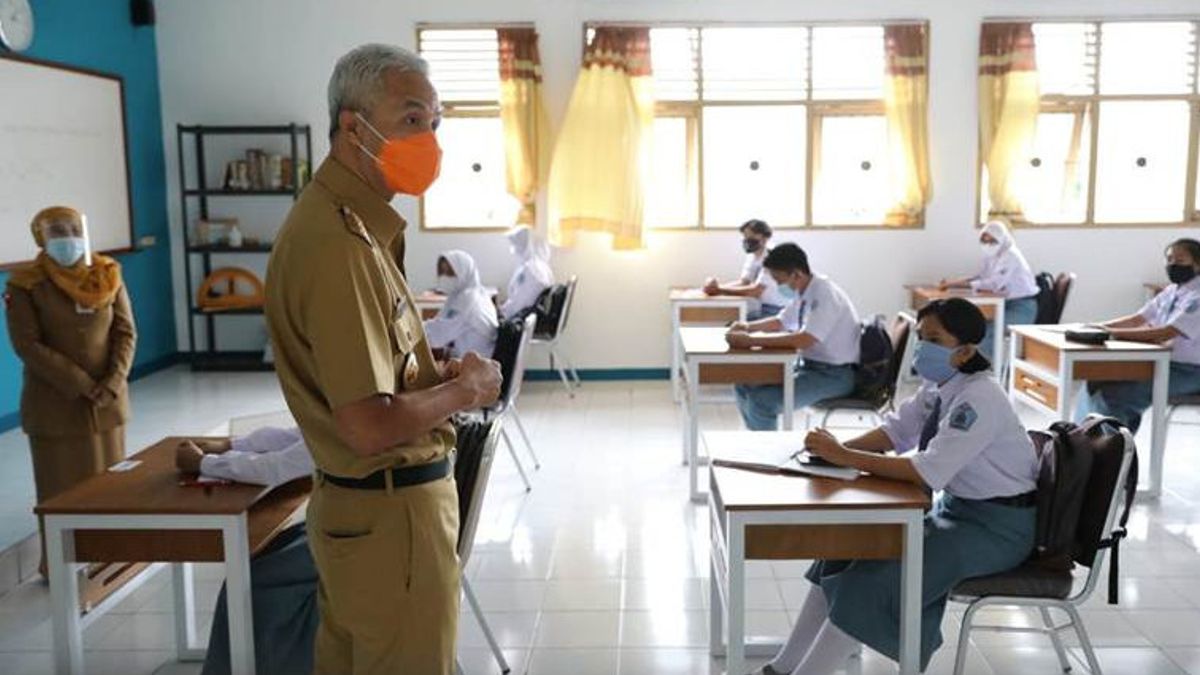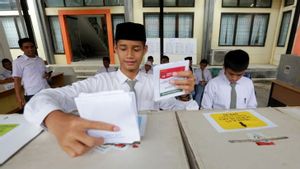JAKARTA - The case of a diploma-resistant school is a classic problem that keeps repeating itself. The alumni of MAN 1 Brebes, Zulmi Aulia Ashari, became the latest victim. In fact, he has graduated from 2021. Arrears in payments are the reason the school withheld his diploma.
The problem caught the attention of the general public. Ganjar Pranowo, for example. The Governor of Central Java (Central Java) appealed to parents to report if there was a school problem with holding a diploma. Ganjar guarantees to intervene. One or two days later. Then what happened to other regions?
Zulmi Aulia Ashari's parents, Akhmad Basori, were sad that their son's diploma was detained by MAN 1 Brebes. Residents of Kaligangsa Kulon Village, Brebes, Central Java have tried their best. However, the result was nil. His two-year-old son never saw his diploma directly.
Even if possible, the diploma can only be viewed through the image of the father's cellphone. Because, that's the only thing that the school allows. Basori also admitted that his financial ability was indeed an obstacle.
He was unable to pay the school fees and contributions for his son's graduation. His son's dream to continue his education at higher education has been disrupted. What is the power of the diploma as an administrative requirement to be detained. "Later, when there is money, just take it," he said.
"My daughter graduated in 2021. Until 2023 it cannot be taken because indeed I have not been able to pay graduation contributions. I still keep a total of Rp. 1,645,000. The details are Rp. 240 thousand for two months of tuition payments, Rp. 270 thousand for the payment of superior XII class money, Rp. 1 million rupiah for graduation and other costs," Basori said as quoted by Kompas.com, July 20.
It may not be Basori himself who feels how difficult it is for his diploma to be detained by the school. The narrative of sadness could be present throughout Central Java. Many parents are confused about taking their children's diplomas because of various problems. From the absence of tuition fees and other costs.
This condition provoked the attention of the entire archipelago. The Governor of Central Java, Ganjar Pranowo, especially. MAN 1 Brebes is his area. He also asked his staff not to do the same again in Central Java. Whatever the reason. Ganjar also guarantees that the Central Java Provincial Government will intervene to solve the problem.
Those who usually have problems (containing diplomas), send them to us, and later if there are, we will take care of them. Is it a country or a private sector. If public schools, I will make sure they are done tomorrow morning. If in the country we make sure if they are detained, tomorrow morning they come out.
"If there is a reason for arrears, then we will finish it because in arrears do not apply. If it is private, we must negotiate with the school first. If it is private, we must talk to schools and foundations," explained Ganjar as quoted by Central Java's Diskominfo, July 26.
The effort that was perpetuated by Ganjar Pranowo deserves appreciation. The Governor of Central Java dared to look at the issue of school resistant to diplomas and potential extortion behind it. However, legal observer Masykur Isnan actually agreed that the policy only applies in Central Java.
The owner of the law firm, Masykur Isnan & Partners, sees that the Indonesian government has never had a uniform regulation on solving problems related to the diploma-resistant school case. Even based on his experience in handling the diploma-resistant school case, the steps taken were never uniform.
He also encouraged the government to make a universal regulation. All of this is perpetuated so that all regional heads -- from governors to mayors have the same guidelines or standard procedures in solving school problems with diplomas.
The problem makes the settlement efforts varied in various regions, not uniform. In the future, I think the government can make a regulation so that regional heads have the same foundation -- standard procedures and norms" and apply widely. "
"In my opinion, what was done in Central Java did not rule out the possibility of being a trigger for the implementation of national regulations. Later, after the policy has been issued, the government will have additional homework, surveillance matters. This step is so that later existing policies can be effective," explained Masykur Isnan.
Masykur Isnan hopes that the government can work quickly on regulatory matters. This is because school fitness is an educational institution, not a guarantor institution. His job is to educate the nation's children. Meanwhile, the step to prevent services is a different effort from this noble task.
He also asked parents in areas who do not have special regulations for school matters that are resistant to diplomas not to worry. He advised every parent to perpetuate persuasive efforts first.
Parents of students are asked to complain to the relevant agencies as an effort to make a middle ground. However, if you encounter a deadlock, then the legal route can be tried. Mainly, because this step is allowed. Even if legal steps according to Masykur Isnan do not have to be a top priority.
This means that parents can perpetuate persuasive efforts. Parents can complain to the local education office. After that, if it doesn't work, then use legal remedies that are constitutionally allowed by our law.
"Generally, which steps are more priority I suggest persuasive steps or communication accompanied by each related agency. Because if it enters the realm of law, it may be that both parties accept the risk. Schools are destroyed reputationally and parents must pay extra," concluded Masykur Isnan.
اقرأ أيضا:
The English, Chinese, Japanese, Arabic, and French versions are automatically generated by the AI. So there may still be inaccuracies in translating, please always see Indonesian as our main language. (system supported by DigitalSiber.id)


















